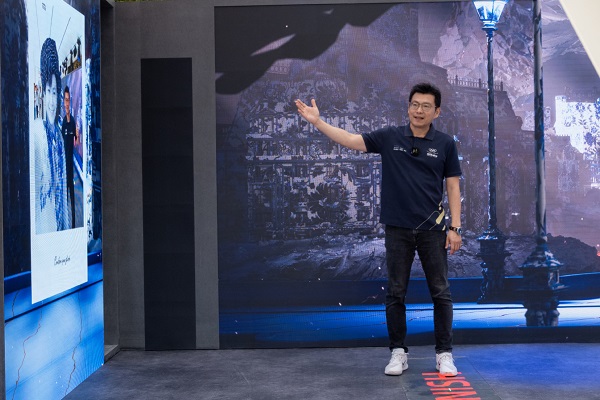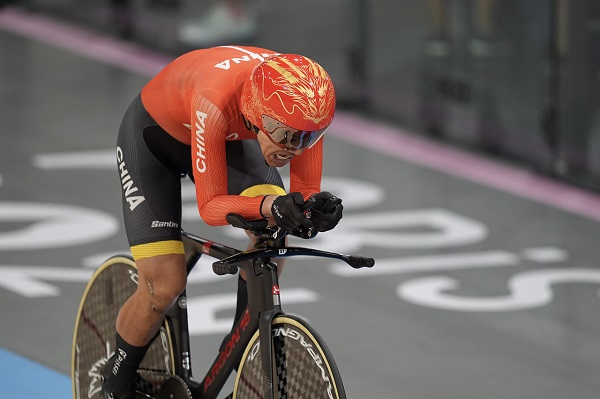Chinese firms shine, achieve excellence at Games
Companies enhance viewing experience for fans, provide top-class sports equipment
One hundred years after the previous Summer Olympics in France, the world's premier sporting event returned to Paris with great fanfare this year and Chinese companies played a significant role in making them the success they were.
Today, innovative Chinese companies are at the forefront of key Olympic and Paralympic Games infrastructure.
Alibaba, the Chinese e-commerce giant, provided cloud-based broadcasting capabilities, pioneering AI-powered multicamera replay technology to elevate the viewing experience for fans. Many other Chinese companies also made their mark.
Taishan Sports, a leading supplier of sports equipment from Shandong province, provided the judo and wrestling mats, continuing its legacy of serving in seven Olympic and Paralympic Games.
Hebei Zhangkong Barbell Manufacturing supplied the specialized barbells used in the weightlifting events, building on its reputation as a trusted supplier for the Olympics.

Chris Tung, president of strategic development at Alibaba Group, presents "Alibaba Wonder Avenue" on the Champs-Elysees in Paris during the Games. [Photo provided to China Daily]
Chris Tung, president of strategic development at Alibaba Group, said: "Our goal is to use technology to innovate the Games. With cloud-based broadcasting, the audience will be able to see more different versions of videos in real time, not only on TV, but also across the short-video platforms and mobile devices they love to watch."
Emphasizing the global significance of the Olympics, he added: "When it happens, it's magical — it captures the attention of people worldwide. Naturally, it forms a powerful platform for us to showcase the innovative applications we've been developing around the world."
Tung underscored the importance of providing an engaging experience for viewers, saying: "There are billions of people who love to watch the Olympics on TV or online. For those not present at the venues, it's important to deliver the Games in a more engaging and exciting way. That's where AI and cloud platforms can elevate the viewing experience by presenting the most exciting moments with enhanced clarity."
At the Paris Olympics, Alibaba introduced its latest multicamera replay service, allowing broadcasters to freeze the action at any moment and rotate around the still image. Tung believes this feature adds a new level of excitement and engagement for viewers.
Alibaba's vision extends beyond enhancing the broadcast experience. The company showcased its technological prowess through events like Alibaba Wonder Avenue on the Champs-Elysees in Paris, where it demonstrated the future of shopping with AI-powered solutions.
Throughout the Games, Alibaba welcomed fans to explore how technology is revolutionizing the e-commerce experience. An intelligent shopping assistant, powered by Qwen, Alibaba Cloud's proprietary language model, offered a personalized service to each visitor, highlighting the power of AI through Qwen's multilingual and image-generation capabilities.
According to Tung, Alibaba's success in leveraging the Olympics is largely due to its youthful and talented workforce. In an interview with China Daily at Alibaba's new headquarters in Hangzhou, Zhejiang province, before the Olympics, he said: "Our employees are generally young. With over 200,000 employees, the average age is under 35."
Tung said young people are attracted to Alibaba because it offers them the chance to "make a difference" in an environment that is open and where the possibilities are endless.
"Many of our innovative initiatives come from young, newly hired employees who bring forward ideas that benefit both our business and the world," he said. "And they actually see these ideas come to life. We have many examples of this."
Gaining recognition
Alibaba's contributions to the Paris Olympics have been recognized by the International Olympic Committee, or IOC.
During the event, Thomas Bach, president of the IOC, said: "Alibaba plays an essential role when it comes to supporting technology during the Olympic Games, greatly increasing the efficiency and sustainability of Olympic Games operations. Our partnership also extends beyond the Olympic Games, with Alibaba playing a defining role in our Olympic AI Agenda, helping us harness the great potential of AI in a responsible way. All these examples highlight how Alibaba is the perfect partner when it comes to shaping our digital future."
He added that the partnership with Alibaba was a perfect embodiment of the Olympic motto "Faster, Higher, Stronger — Together".
While Alibaba, a major global technology player, was selected to support Olympic operations, smaller Chinese companies also made significant strides on the international stage during the Olympics, including Taishan Sports, which began as a small family-run business in 1978 in Shandong province.
The company has since grown into a global leader in its field and, in 2023, was chosen as the exclusive supplier for judo and wrestling events at the Paris Olympics and Paralympic Games.
Speaking in front of the Eiffel Tower, near the Champ-de-Mars Arena that was chosen to house judo, wrestling and wheelchair rugby events at the Olympics and Paralympics, Zhuang Lulu, the company's France representative, said: "After more than 40 years of dedication, we have supported seven Olympic Games, three Youth Olympic Games, seven World University Games and seven Asian Games.
"We have now become a globally renowned brand that sets and leads international sports equipment standards."
For the judo events alone during the Games, the company provided more than 2,100 high-technology, eco-friendly mats embedded with chips. Additionally, Taishan Sports supplied a range of pre-competition training and indoor fitness equipment for the Chinese national team's training base during the Paris Olympics 2024.
"Each stage of the process — from research and design to raw material supply, production, and quality inspection — is strictly controlled to ensure compliance with international certifications, showcasing Chinese manufacturing on the global stage," Zhuang said.
While Taishan Sports is now a global leader in the sports equipment industry, it is remarkable to consider that more than 40 years ago, the company's founder, Bian Zhiliang, started it all from his own home, working on a kang, a traditional heatable brick bed common in northern China.
"At that time, there was no factory. We worked right on a kang bed, sewing these mats by hand. We had no specialized equipment, just our hands, a few large needles and a couple of scissors. We even used a kitchen knife to cut the judo mats and stitched them together," Bian said in an interview at his factory museum in the small town of Laoling, Shandong province.
Bian explained that Taishan Sports was able to provide the judo and wrestling mats for the Paris Olympics and Paralympics due to its innovative products and unparalleled global service.
"It's not just about the mats, we're showcasing our new leading materials to the world. Our products now account for over 60 percent of training and competition needs across more than 200 countries and regions," he said. "This included the Tokyo Olympics, where judo, Japan's national sport, used Taishan mats. Our materials demonstrate unmatched technological innovation and quality, especially in ensuring athletes' safety."
According to Bian, Taishan Sports has been one of the largest equipment suppliers in Olympic history. The company's equipment witnessed athletes winning 122 gold medals out of the total 302 at the Beijing Olympics, a feat unmatched by any other global company.
In recognition of Taishan Sports' work and service during the Paris Games which was marked by "zero errors, zero malfunctions, and zero complaints", Bian was appointed honorary vice-chairman of the International Judo Federation during the event.
In addition to Taishan Sports, Chinese manufacturer Zhangkong Barbell from Hebei province also made a significant impact at the Paris Olympics, serving as the exclusive supplier of weightlifting equipment for the Games.
The company first entered the Olympic stage at the 2008 Beijing Olympics, breaking a six-time Olympic streak held by Japanese companies as the sole suppliers of Olympic barbells.
Building on its experience from the Beijing Olympics, Zhangkong Barbell went on to supply equipment for the 2016 Rio de Janeiro Olympics, the 2020 Tokyo Olympics, and now the 2024 Paris Olympics, marking its fourth appearance as the Olympic weightlifting equipment supplier.
"The production of specialized equipment for the Paris Olympics began in October 2023," Zhang Zhiguo, the company's general manager, told People's Daily. "We assembled a technical team to conduct extensive experiments and tests, ultimately creating products that meet both the aesthetic requirements of the Organizing Committee and the quality standards of the International Weightlifting Federation."
High standards
Although weightlifting equipment may seem straightforward, it demands exceptionally high technical standards during manufacturing.
"In the past, weight plates were secured with screws and rubber rings. Upon impact, gaps would form between the rubber ring and the metal plate, potentially causing misalignment and affecting the concentricity and stability of the plates," explained Zhang.
To address these issues, the company developed its own press machine using integrated pressing technology, which can produce a rough weight plate in just 30 minutes, doubling production efficiency and effectively eliminating alignment problems.
The barbells, designed for long-term use despite impacts and vibrations, require raw materials with extremely high tensile strength, elastic limits, and fatigue resistance. To further reduce barbell vibrations, the company updated its original rubber formula.
"The improved weight plates now come to a stop after a secondary bounce, with a maximum bounce height of just 10 centimeters, exceeding national standards and increasing the product qualification rate from 60 percent to 95 percent," Zhang said.
"We share the same aspiration as our athletes — to shine on the Olympic stage for our country. Looking ahead, we aim to develop and produce more products that support national fitness and youth sports development, with the goal of creating a globally recognized Chinese sports brand."
This summer in Paris, it has been evident that Chinese companies have not only contributed to the success of the Games but have also showcased China's emergence as a global leader in technology and manufacturing. Their innovations and commitment to excellence have made a substantial impact on both Olympic and Paralympic events, demonstrating their ability to support athletes of all abilities and furthering China's standing on the world stage.



